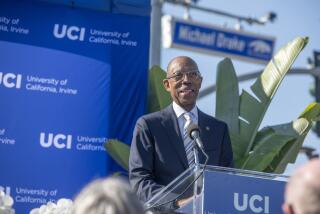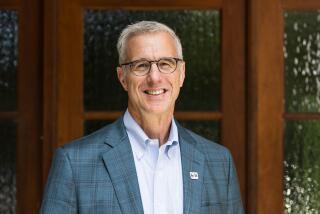United Way L.A. Chapter Picks Leader : Charity: University administrator Herbert L. Carter is selected. The recession has forced fund-raising goals to be lowered.
- Share via
The United Way’s troubled Greater Los Angeles chapter on Thursday named longtime university administrator Herbert L. Carter as its new president, filling a seven-month vacancy created by the resignation of the previous top executive.
Carter, who until last May chaired the United Way’s board of directors, was selected from a field of 70 candidates, United Way officials said. The 58-year-old Los Angeles resident is executive vice chancellor for the California State University system and one of the highest-ranking blacks in the state’s higher education administration.
He replaces Leo P. Cornelius, who resigned in May shortly after it was announced that United Way had fallen $12 million short of its annual fund-raising goal.
Carter is scheduled to begin the job in March and will earn an annual salary between $190,000 and $225,000, United Way spokeswoman Sandra Manning said. Cornelius was paid $211,000 a year.
Faced with a deepening economic recession and layoffs throughout the region’s industries, United Way has been forced to lower its fund-raising goals. In the campaign that began in September and ends in March, the organization hopes to bring in donations totaling $88 million.
In the previous year’s drive, the charitable organization raised $90 million, far short of its $102-million goal.
Carter was vacationing out of town this week and, through a spokeswoman, declined to be interviewed.
In a prepared statement, he said he would work with “all segments” of the Los Angeles community to “make a lasting, positive difference” in fighting problems ranging from homelessness and health care for the poor to gang violence and substance abuse.
Carter, who chaired the board of directors from 1989 to May of this year, said “the current economic climate has escalated the needs of our citizens as never before. I believe that United Way can be an effective vehicle for facilitating changes that need to occur for the common good.”
Carter has worked in administration for the California State University system since 1974, assuming the system’s No. 2 spot in 1987. He was one of the few top officials to survive the turmoil surrounding the forced resignation of Chancellor W. Ann Reynolds, who stepped down in April, 1990, amid a scandal over hefty pay raises for administrators.
Some observers suggested that Carter would help the United Way in its ongoing efforts to reach out to less traditional agencies and shift more power to minority groups. The organization in the past was criticized for its dominance by white males and for failing to address itself to the expanding social and health needs of minorities.
“He is a person with a strong commitment to fairness and to helping all people in need, which is a good sign for United Way,” said Municipal Judge Rand Schrader, who chairs United Way’s AIDS task force. “The biggest challenge for Dr. Carter . . . is can they move fast enough to maintain public support.”
In fact, Carter’s original introduction to United Way came in 1968, when he and a group of black activists met with the organization’s officials to complain about service to minority communities.
A member of the board of directors told Carter that, instead of complaining, he ought to join. He did, and worked his way up through the organization in a variety of volunteer positions. Carter served on and eventually chaired numerous committees. He founded United Way’s Black Partnership Development Council in 1987 and participated in a program designed to help the organization redefine its mission in a changing, ethnically diverse Los Angeles.
“We have to do that or go the way of the dinosaurs,” Carter told a Los Angeles Times interviewer in 1989. “United Way has been perceived as a staid bureaucratic organization removed from the community, doing only what has been ‘safe.’ What we are now after is a sense of venture to prevent problems in the first place, rather than come along later and try to cure them.”
More to Read
Sign up for Essential California
The most important California stories and recommendations in your inbox every morning.
You may occasionally receive promotional content from the Los Angeles Times.











